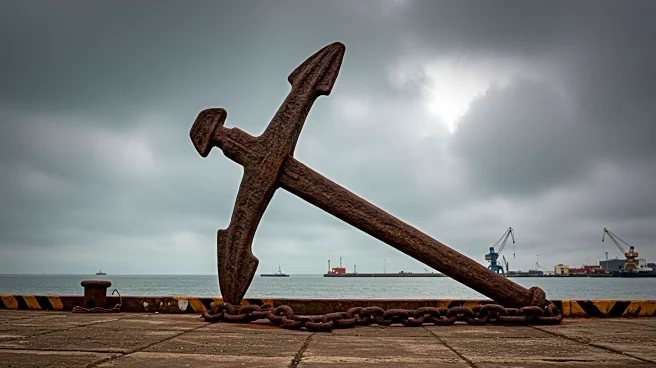What is the story about?
What's Happening?
The ship recycling industry is experiencing a slowdown in the supply of meaningful units, particularly in the Indian sub-continent markets. According to GMS, the situation has been grim since early 2024, with recyclers receiving tonnage in a manner described as 'drip fed.' This has been exacerbated by the ongoing profitable gains from newbuilding productions, which continue to fill seaways with units past their prime. Despite some tonnage arriving at waterfronts, especially in Pakistan, the industry is likened to receiving a 'band-aid' rather than a long-term solution. The market has seen a decline in vessel offerings and prices, notably in Bangladesh, where steel products are stockpiled. Prices in Pakistan and India have stabilized at new lows, approximately $60/LDT lower than earlier peaks.
Why It's Important?
The slowdown in ship recycling has significant implications for the maritime industry and global trade. The reduced supply of recyclable tonnage affects the availability of steel and other materials, impacting construction and manufacturing sectors. The stabilization of prices at lower levels in key markets like India and Pakistan indicates a shift in economic dynamics, potentially affecting local economies reliant on ship recycling. Additionally, the compliance with new regulations by non-Hong Kong Convention yards presents challenges and opportunities for the industry, as it navigates regulatory changes and market uncertainties.
What's Next?
The ship recycling industry may continue to face challenges as it adapts to regulatory changes and fluctuating market conditions. Stakeholders might focus on enhancing compliance with new regulations to ensure long-term sustainability. The industry could also explore alternative strategies to manage the supply of tonnage and stabilize prices. As global trade patterns evolve, the demand for recycled materials may shift, influencing future market dynamics.
Beyond the Headlines
The current situation in ship recycling highlights broader issues of sustainability and environmental impact. The industry's reliance on older vessels underscores the need for innovation in recycling processes and materials management. The regulatory landscape, particularly concerning compliance with international conventions, may drive long-term shifts in industry practices, promoting more sustainable and environmentally friendly operations.















